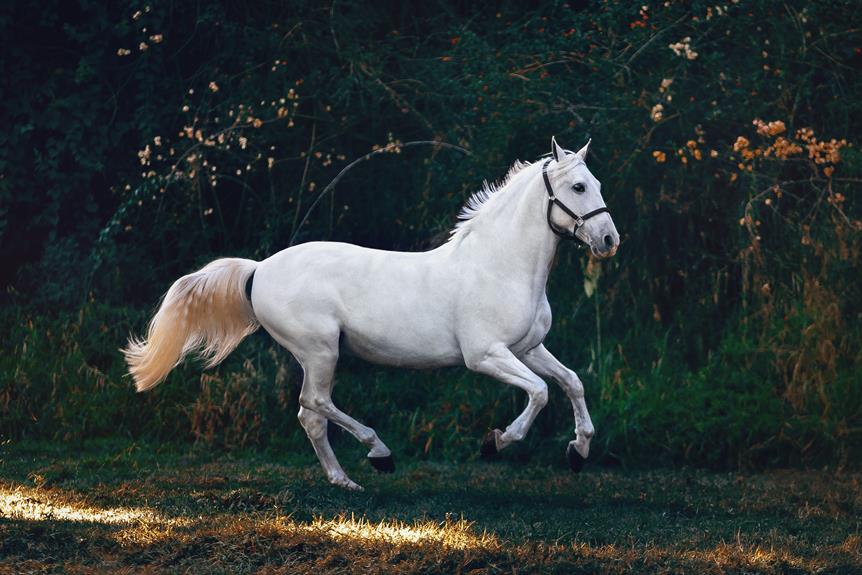Have you ever wondered how long Quarter Horses can live? These majestic creatures, known for their speed and versatility, have a lifespan that can span several decades.
But what factors contribute to their longevity? How can you ensure that your Quarter Horse lives a healthy and fulfilling life?
In this discussion, we will delve into the average lifespan of Quarter Horses, explore the various factors that influence their longevity, and provide you with valuable insights on how to care for these remarkable animals.
So, let's embark on this journey together and uncover the secrets behind the lifespan of Quarter Horses.
Key Takeaways
- Quarter Horses have an average lifespan of 25 to 35 years, with some living up to 40 years.
- Care, genetics, and size influence their longevity.
- Regular veterinary care, a balanced diet, and appropriate exercise are essential for their well-being.
- Genetic factors, diet, exercise, and proper care all play important roles in determining the lifespan of Quarter Horses.
Average Lifespan of Quarter Horses
The average lifespan of Quarter Horses ranges from 25 to 35 years, with some individuals living up to 40 years. As one of the most popular horse breeds, Quarter Horses are known for their strength, agility, and versatility. However, like all living beings, their longevity is influenced by various factors such as care, genetics, and size.
Proper care plays a significant role in determining the lifespan of Quarter Horses. Regular veterinary care, a balanced diet, and appropriate exercise are essential to ensuring their well-being. By providing them with the necessary vaccinations, dental care, and deworming, you can help prevent health issues and prolong their life expectancy.
It's important to note that Quarter Horses may start experiencing health problems around 15 years of age. As they age, they may be more susceptible to conditions such as arthritis, dental issues, and metabolic disorders. Regular check-ups and prompt treatment can help manage these problems and improve their quality of life.
While the average lifespan of Quarter Horses falls between 25 to 35 years, it's crucial to remember that individual horses may surpass this range. With proper care and attention, some Quarter Horses have been known to live up to 40 years or even longer. So, provide your Quarter Horse with the love and care they deserve to ensure they live a long and happy life.
Factors Influencing Quarter Horse Longevity
To ensure the longevity of your Quarter Horse, several factors come into play. These factors include genetics, nutrition, exercise, healthcare, and environmental conditions. Just like any other horse breed, the lifespan of your horse can be influenced by these factors.
Genetics play a significant role in determining how long your Quarter Horse will live. Some bloodlines may be more prone to certain health conditions, which can affect their lifespan. It's important to choose a horse with a strong genetic background to increase the chances of a long and healthy life.
Proper nutrition is crucial for the longevity of your Quarter Horse. Providing a high-quality diet that includes the right balance of protein and fiber can help promote overall health and well-being. Regular exercise is also essential for maintaining a healthy weight and keeping muscles and joints strong. Walking and specific exercises to improve flexibility can contribute to a longer lifespan for your Quarter Horse.
High-quality healthcare is vital for extending the lifespan of your Quarter Horse. Regular veterinary check-ups, preventive vaccines, and prompt treatment of any health issues are essential. By providing your horse with the best possible care, you can help prevent diseases and ensure their overall well-being.
Environmental conditions also play a role in the longevity of Quarter Horses. Providing adequate space, shelter, and a balanced lifestyle can positively impact their lifespan. A healthy and stress-free environment can contribute to a longer and happier life for your horse.
Genetic Factors Affecting Quarter Horse Lifespan
Considering the impact of genetics on Quarter Horse longevity, it is crucial to understand the genetic factors that can affect their lifespan. Genetic inheritance plays a significant role in determining the potential lifespan of Quarter Horses. Certain genetic factors can predispose Quarter Horses to specific health issues that may affect their longevity. Selective breeding practices can impact the overall genetic health and lifespan of Quarter Horses. Genetic predispositions to age-related conditions, such as arthritis, can influence the lifespan of Quarter Horses. Understanding the genetic factors affecting Quarter Horse lifespan can help in making informed breeding and care decisions.
To further illustrate the importance of genetic factors, let's take a look at a table highlighting the potential impact of genetic factors on Quarter Horse lifespan:
| Genetic Factors | Effect on Lifespan |
|---|---|
| Inherited Diseases | Shorter Lifespan |
| Healthy Genetic Traits | Longer Lifespan |
| Genetic Predisposition to Age-related Conditions | Shorter Lifespan |
As shown in the table, the presence of inherited diseases can lead to a shorter lifespan for Quarter Horses. On the other hand, possessing healthy genetic traits can contribute to a longer life. Additionally, a genetic predisposition to age-related conditions like arthritis can also impact the lifespan of Quarter Horses, potentially shortening it. Understanding these genetic factors is crucial for breeders and owners to make informed decisions that can positively influence the lifespan of Quarter Horses.
Impact of Diet and Exercise on Quarter Horse Lifespan
Balanced diets and regular exercise significantly impact the lifespan of Quarter Horses. Taking care of your Quarter horse's diet and exercise routine is crucial for ensuring a long and healthy life.
Quarter horses live an average of 25 to 35 years, but with proper care, some can live up to 40 years. The American Quarter Horse, known for its ability to run a quarter-mile, is a popular breed with a lifespan ranging between 25 to 35 years.
To ensure your Quarter horse lives a long and healthy life, it's important to provide a balanced diet. This means feeding them nutritious and easily digestible food that meets their specific dietary needs. A diet rich in high-quality forage, such as grass and hay, along with appropriate supplements, can help maintain their overall health and longevity.
In addition to a balanced diet, regular exercise is essential for Quarter horses. They're active animals that require physical activity to keep their muscles strong and their minds stimulated. Regular exercise can help prevent obesity, maintain cardiovascular health, and promote overall well-being. Engaging in activities like riding, lunging, and turnout can help keep your Quarter horse fit and healthy.
Importance of Proper Care and Healthcare for Quarter Horses
Regular veterinary check-ups and proper care are essential for maintaining the health and well-being of Quarter Horses. By providing your horse with regular check-ups, you can ensure that any health issues are detected early and treated promptly.
In addition to veterinary care, there are several other important aspects to consider when it comes to the proper care and healthcare of your Quarter Horse:
- Keep Your Horse on a Balanced Diet: Providing your horse with a balanced diet that includes high-quality protein and essential nutrients is crucial for their overall health and longevity. Consult with a veterinarian or equine nutritionist to determine the specific dietary needs of your horse based on their age, activity level, and any health conditions they may have.
- Proper Dental Care: Just like humans, horses require regular dental care to maintain their oral health. Regular dental check-ups and addressing any dental issues, such as sharp points or tooth decay, are important to ensure the comfort and overall well-being of your Quarter Horse.
- Regular Exercise: Regular exercise is vital for maintaining the physical health and mental well-being of your Quarter Horse. Tailor the exercise regime to the specific needs and age of your horse to ensure they stay fit and active.
- Creating a Safe Living Environment: Providing your Quarter Horse with a safe and comfortable living environment is essential for promoting their longevity and overall health. Make sure they've adequate living space, protection from the elements, and a clean and well-maintained stable or pasture.
Frequently Asked Questions
What Breed of Horse Lives the Longest?
The longest-living horse breed is the Morgan, benefiting from genetics, fewer leg problems, and easy care. Factors such as care, size, genetics, and health influence the lifespan of different horse breeds.
What Is the Most Loyal Horse Breed?
The American Quarter Horse is widely regarded as the most loyal breed. They form deep emotional connections with their handlers, showcasing traits like dependability and trustworthiness. Their loyalty impacts performance and training, making them a popular choice for riders seeking a devoted equine partner.
What Is Special About Quarter Horses?
Quarter horses are known for their versatility, gentle disposition, and agility. They excel in various activities such as ranch work, racing, and rodeos. Their strong build and distinctive features make them popular in Western riding disciplines.
What Horse Breed Can Run the Longest?
The horse breed known for running the longest is the Arabian, known for being endurance champions. They can cover long distances without tiring. Other breeds like Thoroughbreds, Standardbreds, and Akhal Tekes also excel in stamina and long-distance running.
Conclusion
So, if you're wondering how long Quarter Horses can live, the average lifespan is between 25 and 35 years, but some can reach up to 40 years.
Taking care of their health, providing proper nutrition, exercise, and regular healthcare can greatly influence their lifespan.
Genetic factors and overall care also play a role.
Remember, with the right care and attention, Quarter Horses can enjoy a long and healthy life.



0 Comments